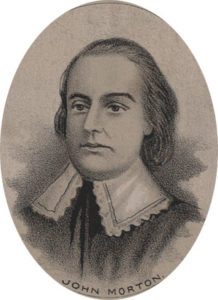April Fool’s Day is today! The custom of April Fool’s Day may have begun in France in the 1500’s. Before then, New Year’s started on March 25th and ended April 1st. People gave gifts on April 1st to mark the beginning of the new year. Then New Year was moved to January 1st, but some people still gave gifts on April 1st as jokes. The custom spread to Britain in the eighteenth century and then to other countries.
 John Morton died in 1777. His date of birth is unknown. Active in politics, he was elected from Pennsylvania to serve in both the First Continental Congress and the Second Continental Congress. He signed the Declaration of Independence, and he was part of the committee that wrote the Articles of Confederation. He was the first Declaration of Independence signer to die. Children could learn more at: John Morton.
John Morton died in 1777. His date of birth is unknown. Active in politics, he was elected from Pennsylvania to serve in both the First Continental Congress and the Second Continental Congress. He signed the Declaration of Independence, and he was part of the committee that wrote the Articles of Confederation. He was the first Declaration of Independence signer to die. Children could learn more at: John Morton.
Oliver Pollock created the dollar sign ($) in 1778.

San Antonio Missions
San Antonio Missions National Historical Park was established in 1983. Five Spanish missions were created around 1690 to 1720 in what is now San Antonio, Texas. Today four of the missions are part of the San Antonio Missions National Historical Park. The sites include Mission Concepción, Mission San José, Mission San Juan Capistrano, and Mission Espada. The fifth mission is the Alamo, administered by the Texas General Land Office. On July 5, 2015, the five missions became a UNESCO World Heritage site. Children can learn more at: http://www.nps.gov/saan/index.htm.
William Harvey (born Folkestone, Kent, England, 1578; died London, England, June 3, 1657) discovered how blood circulated in mammals. Prior to his work, many scientists believed the liver changed food to blood and the body consumed that blood. Through experiments and observations, he found that the heart acts like a pump and that blood moves through veins and arteries, forming a closed system of circulation.

Wangari Maathai
Wangari Maathai (born Ihithe Village, Kenya, 1940; died Niarobi, Kenya, September 25, 2011) started the Green Belt Movement in Kenya in the 1970’s. This group taught women how to plant trees. These trees then provided them with income. Often in conflict with Kenya’s government, she began to gain the world’s attention. In 2004 she became the first African woman to receive the Nobel Peace Prize. She was elected to Kenya’s Parliament and served as assistant minister to President Mwai Kibaki. Children coud read Mama Miti: Wangari Maathai and the Trees of Kenya, written by Donna Jo Napoli and illustrated by Kadir Nelson.
Anne McCaffrey (born Cambridge, Massachusetts, 1926; died Wicklow, Ireland, November 21, 2011) wrote science fiction books for children. She is perhaps best known for her Dragonriders of Pern series.
Sergei Vasilievich Rachmaninoff (born Semyonovo, Russia, 1873; died Beverly Hills, California, March 28, 1943) was a Russian composer, conductor and pianist. He composed at least 45 major works. He moved to the United States in order to escape the Bolshevik Revolution and eventually became an American citizen. Experts state his compositions reflect a romantic style influenced by his Russian heritage. Idea: Russians celebrate birthdays by making one-crust pies. Make a birthday pie. Eat pieces of the pie and listen to Rachmaninoff’s music.
Jagjivan Ram (born Chandwa, Bihar, India, 1908; died New Delhi, India, July 6, 1986) worked closely with Gandhi and Nehru to gain India’s independence from Great Britain. Ram, born into the “untouchable” caste, was one of the first “untouchables” to graduate from college. He labored to eliminate the caste system and served in various cabinet positions in the new Indian government.
Libby Riddles (born Madison, Wisconsin, 1956) in 1985 was the first woman to win the 1,135-mile Iditerod. Children can read about her activities at: Libby Riddles.
Jan Boyer Wahl (born Columbus, Ohio, 1933; died Toledo, Ohio, January 29, 2019) wrote over 120 books for children. His books include Jamie’s Tiger and Grandmother Told Me.